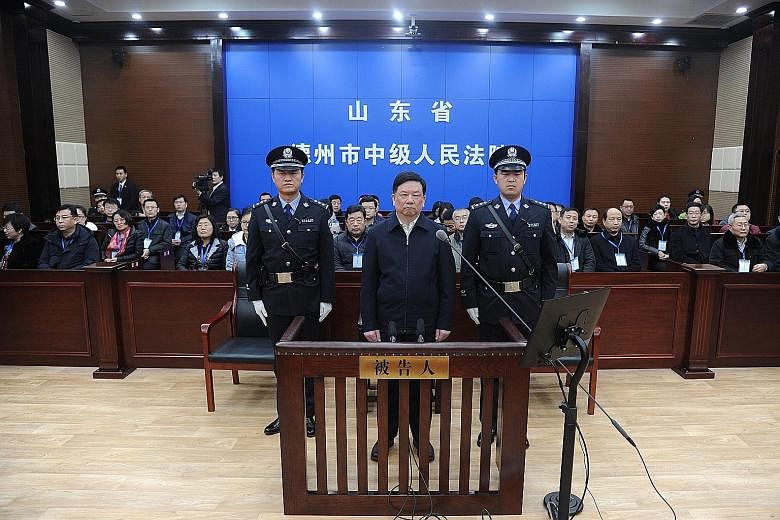BEIJING • China is planning a new national supervisory agency that will be set up in March next year as part of efforts to institutionalise the anti-graft drive.
The new National Supervision Commission, which has been compared to Hong Kong's Independent Commission Against Corruption, will be on a par with state organisations like the State Council and the Supreme People's Court.
The new national-level commission will integrate various government and prosecutorial anti- corruption departments with the party's anti-graft watchdog, according to the South China Morning Post (SCMP).
The new commission will be empowered to investigate all public office-bearers and civil servants, regardless whether they are members of the Chinese Communist Party.
Members of the new commission will investigate staff at all public organisations, including administrative institutions, judicial organs, schools and hospitals.
A new law to establish the new commission is expected to be passed at the annual legislative session in March next year, according to a work report delivered by the Communist Party's Central Commission for Discipline Inspection (CCDI) two weeks ago and made public on Thursday.
China's anti-corruption campaigns have so far been spearheaded by the CCDI, a party organ.
Inspectors from the party's headquarters are dispatched to local governments, state-owned enterprises and other organisations to crack down on corruption.
While the CCDI has been credited with netting corrupt officials and helping the party regain its moral standing among the Chinese people, critics warn that its unchecked authority in detaining and interrogating cadres could be used for political gain.
Some critics have charged that the ongoing anti-corruption campaign has been used to target opponents of President Xi Jinping, according to SCMP. Mr Wang Qishan, the head of CCDI, is a close ally of Mr Xi.
The new state-level supervisory body will be answerable to the National People's Congress, China's Parliament.
But the move could also further weaken judiciary independence, warned Professor Tong Zhiwei, a law academic with East China Normal University.
"Before the founding of the commission, the CCDI did not need to report to the National People's Congress. There was no law to regulate it, either... But this move also further empowers the CCDI, as it merges it with other anti-corruption forces in the prosecutors' office," he was quoted as saying by SCMP.
Senior officials have said that the new commission will share the same offices and largely the same personnel with the CCDI.
China has taken its anti-corruption battle global, publishing a list of the 100 most-wanted corruption suspects who have fled abroad to countries such as the United States, Canada and Australia, often taking their wealth with them.
The Chinese authorities have said they clawed back 2.3 billion yuan (S$478 million) in graft proceeds from more than 70 countries and regions in the first 11 months of last year, according to Reuters.
In an unusual step, Mr Wu Yuliang, deputy head of the CCDI, briefed representatives of 113 diplomatic missions and 13 international bodies on Thursday about efforts to fight graft, Xinhua news agency reported.

